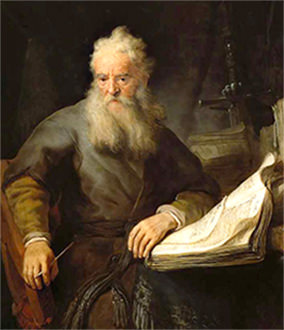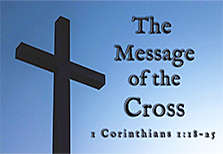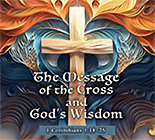First Corinthians 1:18–2:5 . . .
The World’s Reasoning vs. God’s Wisdom
Paul begins by writing, “For the message of the cross is foolishness to those who are perishing, but to us who are being saved it is the power of God” (v. 18). He makes it clear that there are only two categories of people: the “perishing” and the “saved.” Ultimately, all must fall into one of these two classes; no other class exists. He’s revealing that those who are perishing consider the word of the cross “foolishness.”
While the unbeliever considers the cross utter nonsense, the Christian sees it as “the power of God.” The word of the cross isn’t simply good advice or helpful information; it’s the power of God! In other words, our victory in salvation and life can only be attained through the cross. The cross is everything to the Christian.
In v. 19 (shown at the bottom of this page) Paul quotes an Old Testament Scripture: Isaiah 29:14. In v. 20 NIV, Paul launches into four rhetorical questions. He asks, “Where is the wise person? Where is the teacher of the law? Where is the philosopher of this age? Has not God made foolish the wisdom of the world?” Paul is speaking of the philosopher, the religious scholar, and the debater — each a professional expert. God hasn’t simply disregarded the wisdom of the world or shown it to be foolish — he’s “made foolish the wisdom of the world.”
Paul isn’t against knowledge. God created us to be inquisitive, to investigate, to gather knowledge. But because God knows everything that’s known or could be known, we need to entrust ourselves to him and recognize that he loves to cut the wise and powerful down to size.
In vv. 22–24, Paul explains himself further:
1) Many people stumble over the cross (vv. 22a, 23a). The Jews “stumbled” over the cross because most of them were looking for signs of power. They sought a political leader who’d deliver them from the heel of the Roman Empire. They simply couldn’t imagine a crucified Messiah.
2) Many people laugh at the cross (vv. 22b, 23b). Paul identifies with the Greek quest for wisdom. The Greeks looked to philosophy as the answer to the deepest problems of life. The notion of a man hanging on a cross to save the world was utter nonsense to them. Had they seen it from God’s viewpoint, they’d have discerned the wisdom of God’s great plan of salvation.
3) Some people, however, do believe and experience the power and wisdom of the cross (v. 24). Those who respond through God’s grace are granted his wisdom and power.
In v. 25 NIV, Paul writes these glorious words: “For the foolishness of God is wiser than human wisdom, and the weakness of God is stronger than human strength.” He’s suggesting that “if” (and this is a big “if”) it was possible for God to be foolish and weak, his foolishness and weakness would still overwhelm us! Shouldn’t this humble us?
“Help Wanted: Fools for Christ” might be an appropriate title for the next five verses to Christians in Corinth. I’ll highlight two essential aspects of our message to unbelievers: content and delivery.
1) The content of our message must be Christ (2:1–2). Paul writes, “When I came to you, I did not come with eloquence or human wisdom as I proclaimed to you the testimony about God.” He was probably reflecting back on his year-and-a-half ministry in Corinth (Acts 18:1–18). Here he begins by reminding the Corinthians how he didn’t preach: He hadn’t dazzled his listeners by his rhetorical or philosophical prowess; he’d simply proclaimed the truth about God.
2) The delivery of our message must be God’s power (vv. 3–5). Paul again shares an autobiographical account. He didn’t come to Corinth with any degree of self-confidence. Rather, he came “in weakness with great fear and trembling.” He wasn’t the picture of confident self-assurance that many of us associate with the apostle Paul. He responded in a totally human fashion, like us. Yet, Paul was all about the power of the Spirit. In v. 5, he explains how the power of God is the word of the cross.
Note: 1st Corinthians challenges believers to examine every aspect of their lives through the lens of the Gospel. In chapters 1–4, Paul presents these four challenges:
Christ is God’s wisdom (ch. 1) | Spiritual wisdom (ch. 2)
The church and its leaders (ch. 3) | True apostleship (ch. 4)
› Watch BibleProject’s superb animated video (1 min.) that highlights Paul’s messages in these first four chapters.
† Summary of 1 Corinthians 1:18–2:5
• The Message of the Cross and God’s Wisdom (1:18–25)
Paul contrasts the wisdom of the world with the “foolishness” of the cross. To those who are perishing, the message of the cross appears foolish; but to those being saved, it’s the power of God. The apostle explains that God has intentionally made worldly wisdom seem foolish to reveal God’s power and wisdom through what appears weak or insignificant. The Jews demand miraculous signs, and Greeks seek wisdom, but Paul preaches Christ crucified — a stumbling block to Jews and foolishness to Gentiles. However, for believers, Christ represents both the power and wisdom of God.
• God’s Choice of the Weak (vv. 26–31)
Apostle Paul reminds the Corinthians that many of them weren’t wise, influential, or noble by worldly standards when they were called. Instead, God chose the foolish, weak, and lowly things of the world to shame the wise and strong. This demonstrates that salvation is entirely God’s work, leaving no room for human boasting. Paul concludes by emphasizing that Christ has become their wisdom, righteousness, sanctification, and redemption.
• Paul’s Preaching Focused on Christ Crucified (2:1–5)
The apostle next reflects on his approach when he first preached to the Corinthians. He didn’t rely on eloquence or human wisdom. Instead, he proclaimed the gospel with simplicity and in fear. His message centered on “Jesus Christ and him crucified.” Paul explains that his reliance was on the Spirit’s power so that their faith would rest on God’s power rather than human wisdom.
† Key Themes of this Passage
1) The Power of the Cross (shown here): The message of Christ’s crucifixion is central to salvation. It reveals God’s wisdom and power.
2) God’s Sovereignty in Choosing the Lowly: God deliberately chooses those considered weak or insignificant by worldly standards to demonstrate his glory.
3) Faith in God’s Power: Paul emphasizes reliance on God’s Spirit rather than human abilities or rhetoric for spiritual transformation.
Note: This passage highlights how God’s ways often contradict human expectations. They focus on humility, divine power, and Christ-centered faith.
- Q. 1 If you could boast about one thing regarding your family, what would it be?… How could you boast about yourself?
- Q. 2 How does the world define wisdom? How has “God made foolish the wisdom of the world” (v. 20)?
- Q. 3 How does this passage document that God’s ways are not our ways?… What does this passage say to you about the wisdom of God versus worldly wisdom?
1 Corinthians 1:18–2:5
New International Version (NIV)
[You can view it in a different version by clicking here; you can also listen to these chapters.]
Christ Crucified Is God’s Power and Wisdom
18For the message of the cross is foolishness to those who are perishing, but to us who are being saved it is the power of God. 19For it is written:
“I will destroy the wisdom of the wise;
the intelligence of the intelligent I will frustrate.”
20Where is the wise person? Where is the teacher of the law? Where is the philosopher of this age? Has not God made foolish the wisdom of the world? 21For since in the wisdom of God the world through its wisdom did not know him, God was pleased through the foolishness of what was preached to save those who believe. 22Jews demand signs and Greeks look for wisdom, 23but we preach Christ crucified: a stumbling block to Jews and foolishness to Gentiles, 24but to those whom God has called, both Jews and Greeks, Christ the power of God and the wisdom of God. 25For the foolishness of God is wiser than human wisdom, and the weakness of God is stronger than human strength.
26Brothers and sisters, think of what you were when you were called. Not many of you were wise by human standards; not many were influential; not many were of noble birth. 27But God chose the foolish things of the world to shame the wise; God chose the weak things of the world to shame the strong. 28God chose the lowly things of this world and the despised things — and the things that are not — to nullify the things that are, 29so that no one may boast before him. 30It is because of him that you are in Christ Jesus, who has become for us wisdom from God — that is, our righteousness, holiness and redemption. 31Therefore, as it is written: “Let the one who boasts boast in the Lord.”
2 1And so it was with me, brothers and sisters. When I came to you, I did not come with eloquence or human wisdom as I proclaimed to you the testimony about God. 2For I resolved to know nothing while I was with you except Jesus Christ and him crucified. 3I came to you in weakness with great fear and trembling. 4My message and my preaching were not with wise and persuasive words, but with a demonstration of the Spirit’s power, 5so that your faith might not rest on human wisdom, but on God’s power.


